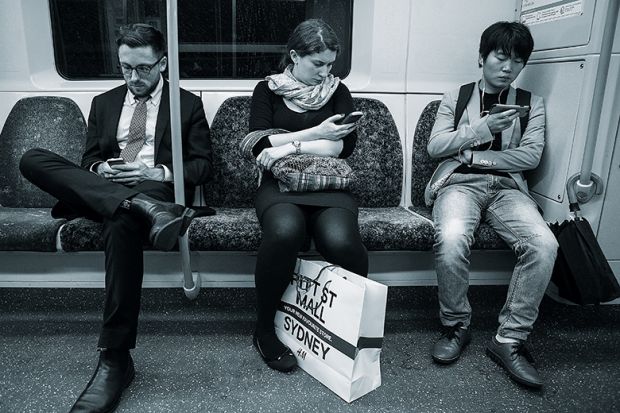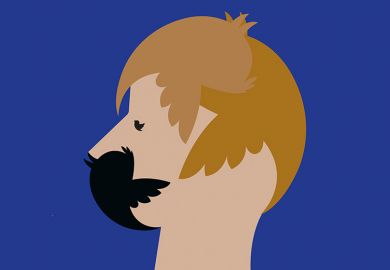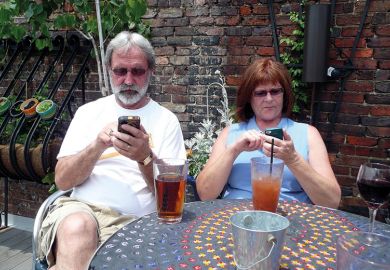The first couple of days without social media were the hardest.
More than once I found myself, phone in hand, thumb tapping the Twitter icon and starting to scroll. More disturbingly, sometimes I wasn’t entirely conscious of having picked up the phone in the first place.
This was my first inkling that I was more dependent on social media than I had previously recognised. I realised that I needed to take this digital detox seriously.
The idea of taking some time off social media is one that I’d been considering for a while.
I had been meeting with students on a regular basis to discuss an issue that all of us in the sector are greatly concerned about: the mental health of our students. One of the things that came up repeatedly in these discussions was the impact of the unrestrained use of social media on their well-being.
The angry tone of so much online discussion, the relentless bombardment of information and opinion – much of dubious provenance – and sometimes the feelings of inadequacy generated by the apparently perfect vision of others’ lives were all causing distress to our students.
Yet there was also the further sense of a reliance on and even addiction to social media among many that I spoke to.
I have been a keen Twitter user for many years. What attracts me to it is the speed, range and directness of contact with experts and professionals in all fields and the ability to communicate directly with our students and staff across the university.
But the wider your network grows, the more frequently you receive updates and it is this that makes it such an addictive experience: if you haven’t checked your account for a while, just what have you missed?
With our students I agreed that a short break from all forms of social media would not only be interesting but also potentially instructive and helpful, too.
The idea grew and I approached our communications team to see how it might work. It was a risky proposition: in a fiercely competitive sector, with social media one of the most powerful recruitment and engagement tools, what would be the impact of switching it off?
But we wanted to spark debate, to explore important issues and to encourage our students and staff to think about their mental health.
We organised activities on campus such as t’ai chi, meditation, origami classes and reading groups to give students alternative ways to use their minds throughout the week.
Then, on 16 January, we went offline. That included me.
One of the first things that I found was that I suddenly had time to watch the world. Waiting for a train on the platform I would normally have pulled my phone out and started scrolling. But here I stood, watching people, listening, just being.
Once on the train, I started to read. Before, I might have intended to read but would have scrolled my newsfeed, sometimes unthinkingly.
Now, though, I luxuriated in the calmness, the sense of being carried to my destination, free to lose myself in a book.
By keeping my Kindle with me over the detox week and pulling it out in place of my phone, I read three books in five days.
Not only that, instead of tweeting an opinion about them, I discussed them at length with friends and family, rediscovering the pleasure of simply talking about books.
There were things that I missed during the week: being able to respond to student questions on Twitter, keeping well briefed on current affairs, getting ball-by-ball updates on the Queens Park Rangers football game.
For those reasons I wouldn’t and couldn’t cut Twitter out of my life permanently. It gives me, as vice-chancellor, an unprecedented level of access to staff and students – in either direction – and enables me to tune in to what they are doing and what they care about.
But I didn’t miss waking up and reaching for my phone first thing, obediently checking my notifications.
I didn’t miss it late at night, filling my head with endless, unsolicited thought and opinion, wondering why, when I turned out the lights, my mind continued to race.
It’s clear that our students and staff experienced similar things throughout the week. At first I had students spotting me on campus, catching me with phone in hand, calling over, “Hope you’re not cheating there!”
As the week progressed they told me how much they were enjoying the time away from their apps and how much they had enjoyed a bit of t’ai chi, calligraphy or, like me, discussing books.
Ultimately, like all aspects of health, using social media is about balance. But it can be hard to know if you’ve got that balance right.
This digital detox has shown me – and many of our students – that perhaps we don’t have it right and, as a consequence, we might be missing out on real, simple, healthy pleasures.
Dominic Shellard is vice-chancellor at De Montfort University.
POSTSCRIPT:
Print headline: Six days without social media...
Register to continue
Why register?
- Registration is free and only takes a moment
- Once registered, you can read 3 articles a month
- Sign up for our newsletter
Subscribe
Or subscribe for unlimited access to:
- Unlimited access to news, views, insights & reviews
- Digital editions
- Digital access to THE’s university and college rankings analysis
Already registered or a current subscriber? Login




